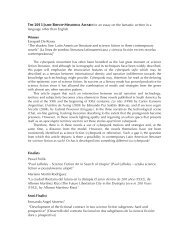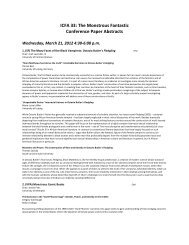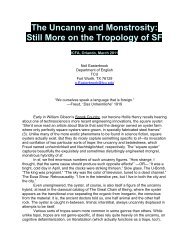142. (F) Maps, and Ankh-Morpork and Game of Thrones PalmChair: A. P. CanavanEdgehill UniversityFantasy City Maps: <strong>The</strong> Cases of Erikson, Lynch, and MiévilleStefan EkmanLund UniversityAlthough the overwhelming majority of the maps that come with fantasy novels portrays the geography of a primary or secondary world,somewhere between two and twelve per cent of the fantasy maps are in fact maps of cities. Like all maps, the fantasy city maps reflect thechoices (conscious and unconscious) of cartographers and mapmakers and a “close reading” of such maps can reveal a great deal about theunderlying assumptions of the genre of fantasy city maps as well as about the how each map relates to the setting it portrays. In a previousdiscussion two maps from Tolkien’s <strong>The</strong> Lord of the Rings, I have demonstrated how paying close attention to fantasy maps as maps can revealthings about the maps beyond the elements used in their construction. In my paper for ICFA 2012, I propose to discuss some of the results froma close reading of the city maps in Steven Erikson’s Gardens of the Moon, Scott Lynch’s <strong>The</strong> Lies of Loch Lamora, and China Miéville’s PerdidoStreet Station. Even a cursory view of these three examples will reveal that they are thematically different from city map genre of actual cities.Rather than mapping specific locations and offering possible routes between these locations by inclusion of various roads and streets, thefantasy city maps mainly appear to focus on the spatial relationships between various areas. Taking this focus on relative locations of urbandistricts as my point of departure, I will use theories of map interpretation suggested by a number of map scholars (in particular Denis Wood) toexamine what the three fantasy city maps can tell us about the places they help bring into being – and how they do it.“Because It Works”: Terry Pratchett’s Ankh-Morpork as Anti-UtopiaAnnette Doblix KlempUniversity of Wisconsin-River FallsTerry Pratchett’s Discworld novels, particularly those featuring the city state of Anhk-Morpork present a view that is decidedly anti-utopian.Unlike dystopian novels, which typically show how well-intentioned political schemes have gone awry, Pratchett’s underlying theme is thatutopian impulses are themselves inherently evil because they are suppressive and life-denying. As Pratchett indicates through a large cast ofcomic eccentrics, the city “works” because it appeals to man’s inherent selfishness and self-interest. While Ankh-Morpork is a setting for manyof the Discworld novels, my paper will deal primarily with <strong>The</strong> Colour of Magic, Guards! Guards! and <strong>The</strong> Thief of Time. <strong>The</strong> Colour of Magicintroduces Ankh-Morpork, but in this novel, the city is primarily a background for Pratchett’s satire of “sword-and-sorcery” fantasy. Guards!Guards! deals in depth with the anti-utopian philosophy which governs the city state. Ankh-Morpork’s Guild system regulates crime by theparadox of catering to organized crime. Under this system, the Thieves’ Guild gets paid by the citizens for not committing crimes and, in turn,acts as a police force that discourages and punishes crime committed by non-guild members. While the majority of Discworld’s inhabitants areruled by self-interest, Pratchett acknowledges the need for leadership. Ironically, the Patrician, the most powerful figure in the city is a comicrendering of many of the virtues attributed by Plato to his philosopher-king or H. G. Wells to his samurai. As a rational and intelligent leader,the Patrician’s most important characteristic is his ability to known “when not to use power.” Rather than try to improve and educate thepopulace, the Patrician defends and improves their city. While my focus is on the three novels mentioned above, one of the primarycharacteristics of Ankh-Morpork is the growth and development it displays as the series develops: the City Watch grows in size andeffectiveness, acceptance of species diversity is promoted, a communication systems (the Clacks) is established, and a functioning postalsystem and currency are instituted. <strong>The</strong> Thief of Time presents the dangers posed by utopian idealism. <strong>The</strong> Auditors, who find humanindividuality too “messy and unpredictable,” wish to improve the world by stopping time and, thereby, eradicating any possibility of change ordifference. <strong>The</strong>ir desires precisely illustrate what many have found to be some of the major difficulties with utopia: its stifling of creativity andindividuality and its static, unchanging quality. While Pratchett’s heroes help to defeat the Auditors, the human physical condition itself islargely responsible for their downfall. What the Auditors learn is that the possession of a body makes complete rationality impossible: theybicker among themselves, and physical sensation (particularly chocolate) eventually leads to their own irrationality and self-destruction. Mypaper will conclude by contrasting Pratchett’s comic satire to the seriousness of most utopian and dystopian fiction, whether found in thegenres of science fiction or fantasy. Typically, the tone prevailing throughout the majority of utopian and dystopian works is somber. Incontrast, Pratchett celebrates the eccentricity of characters existing in a world which sets few, but clearly defined limits upon their expressionsof individuality.<strong>Monstrous</strong> Births and the Abject in Martin’s Game of ThronesElizabeth KemptonSaint Louis UniversityIn this paper, I will explore the popular HBO television series, Game of Thrones and its inspiration, George R. R. Martin’s series of fantasy novels,<strong>The</strong> Song of Ice and Fire. Particularly, I’m interested in mapping the character of Daenerys Targaryen and her configuration as both a Lilith-likemother of monsters and a messianic ruler. Early in the television show and books, Daenerys conceives a stillborn and deformed child. After thischild’s death, Daenerys goes on to experience a second monstrous birth. She walks into her stillborn child and husband’s pyre, holding threepetrified dragon eggs and emerges, nude, clearly nursing three young dragons. This is currently the season finale of the television series. <strong>The</strong>moment appears empowering. <strong>The</strong> book series complicates Daenerys’s relationship to her dragons. She is consistently referred to as “themother of dragons” and at first she is quite affectionate of and maternal with the dragons, but her horror grows as the dragons mature. Thishorror cumulates in a scene in which Daenerys learns that one of her dragons has killed a child. In terror, Daenerys orders the dragons confinedunderground. Yet ultimately, these dragons are clearly positioned by the prophecies of the books as a military asset which Daenerys mustmaster if she is to assume her mythical role as a leader. What I propose interpretively, then, is that both the television show and the books aremapping a sense of coming to terms with Kristeva’s abject through the figure of the monstrous child. Daenerys is forced to confront and
ultimately make peace with her monstrous progeny, if she wishes to save the fictional world of the novels. <strong>The</strong> abject here, cannot be purified,but rather must be accepted, as death and a loss of self will be an inevitable part of Daenerys’s prophesied return to power.143. (IF) From Creation to Apocalypse: <strong>International</strong> <strong>Monstrous</strong> <strong>Fantastic</strong> MagnoliaChair: Rachel Haywood-FerreiraIowa State UniversityFrom Amazons to Zombies: Latin America's <strong>Monstrous</strong> <strong>Fantastic</strong>Persephone BrahamUniversity of Delaware<strong>The</strong> discovery of the Americas challenged long-standing hypotheses about the nature of the world and man’s place in it, and the New Worldbecame the arena for an exceptionally transformative encounter with monsters, real and imagined. Faced with a perilous, awesome, and yetfantastically familiar landscape, Spanish explorers of the New World showed an extraordinary penchant for organizing their pursuits andperceptions according to popular images captured in millennial, fabulous and mythical narratives. Armed with the knowledge of the bestiariesand the certainty of locating an Earthly Paradise, they described their experience in terms of the fantastic and the monstrous. Embodyingexoticism, hybridity, and sexual and other excesses, the monsters of the New World sustained the ongoing conceptualization of the unknownthat was a prerequisite to conquest and control. Columbus's mermaids and cannibals, the anthropophagous landscape of Amazonia; Haiti'sliving dead; all loom in Latin America's literatures as incarnations of desire and dread, but also as avatars of autochthonous culture. Aconsciousness of ex-centricity with respect to Anglo-European culture is constitutive of Latin American intellectual subjectivity, and has ledmany of its best-known writers, such as Carlos Fuentes, Gabriel García Márquez, Julio Cortázar, and Alejo Carpentier, to confront Europeanconcepts of the magical, the surreal, the uncanny, and the fantastic with alternative formulations such as the real marvelous and magicalrealism. This paper examines the mechanisms whereby Latin Americans transfigured and invoked the monstrous fantastic to reinforce LatinAmerican ex-centricity while at the same time inserting Latin American letters into mainstream markets. Construed in terms of the realmarvelous and magical realism , the monstrous fantastic is very much debated within Latin-Americanist criticism, as it exposes the problems ofautochthony and cultural production in a highly syncretic postcolonial setting. <strong>The</strong> changing shape of this discussion over the years allows us toexamine the development of the Latin American response to an ongoing epistemological crisis caused, ironically, by the drive towards selfrecognition.Sense and Nonsense-Ability: Federico Schaffler González’s Brief EternityDale KnickerbockerEast Carolina UniversityFrank Kermode has famously asserted that apocalyptic narratives, like their biblical model “Revelations,” make sense of human history bylooking at it from beyond its end. This essay attempts to demonstrate that Brief Eternity invokes and rewrites the biblical story in order todemonstrate that two of Western civilization’s primary explanatory narratives, Christianity and humanistic, post-Enlightenment reason, areabsurd. Brief Eternity consists of four short stories revolving around the destruction of Mexico City by twelve atomic bombs. <strong>The</strong> first explainsthe event by creating a mythology: Earth is created by a young divinity (hinted to be the Judeo-Christian God)tradition win a contest to see whoin the pantheon can offer the most absurd). <strong>The</strong> second is a story of political intrigue describing the aftermath of the destruction, satirizingMexico’s history and its contemporary politics. <strong>The</strong> third offers a Clancy-esque thriller as an agent attempts to find three cylinders left by theoutgoing President of Mexico that would explain the disaster. <strong>The</strong> final story offers an explanation that creates a historical narrative around theevent, explaining in the rational, cause-and-effect logic employed by historians. <strong>The</strong> “rational” explanation turns out to be every bit asnonsensical as its religious counterpart: the President, bitter at being voted out of power and dying with AIDS, stole and detonated theweapons out of spite. Brief Eternity thus constitutes a critique of the metanarratives we use to understand reality, adopting the existentialistview that human existence is absurd.<strong>Monstrous</strong> Insinuations in José Saramago's CainRonald MeyersEast Stroudsburg University<strong>The</strong> late, great Portuguese author José Saramago (1922-2010), awarded the Nobel Prize for Literature in 1998, has been recognized and cited as amoralist with a wry, if not ironical and opaque style. Though noted for his historical depictions of his homeland, Portugal, he was perhaps thequintessential cosmopolitan author, incorporating major themes from Dostoyevsky to Kafka, to Orwell, to Sartre, to Ionesco, to Gabriel Marquez intohis considerable body of work. His final novel, Cain, published a year before his death and brought out in translation in 2011, continues todemonstrate Saramago's intellectual curiosity and flair for the fantastic. Harold Bloom has noted his "Swiftian irony," all to clear in this novel, and therecent <strong>The</strong> New York Times Book Review cited its connection to the sensibility of Mark Twain. I shall seek further to show in my presentation, both theexuberant comic exaggeration of Rabelais, and Samuel Beckett's mordant irony and absurdist (atheistic, if not nihilistic) world view. In the veryopening page of the novel, Saramago represents his peculiar sensibility in depicting the Lord's frustration with his newly created couple and his "graveoversight" over the inability of "his" human progenitors to express themselves--"be it a bellow, a roar, a croak, a chirp, a whistle, a cackle." In aRabelaisian tour de force of heretical energy of language: "In an excess of rage, surprising in someone who could have solved any problem simply byissuing another quick fiat, he rushed over to adam and eve and unceremoniously, no half measures, stuck his tongue down the throats of first one andthen the other. From the texts which, over the centuries, have provided a somewhat random record of those remote times, be it of events that might,at some future date, be awarded canonical status and others deemed to be the fruit of apocryphal and irredeemably heretical imaginations, it is not atall clear what kind of tongue was being referred to here. . . " Cain, the fratricide and first murderer in the Hebrew Bible is the prototype of greatmonster villains in history and literature, which have included Medea, Oedipus, Clytemnestra, Joseph's brothers, Judah, Jephthah, Macbeth, Richard
- Page 4 and 5:
5. (F) Wondrous Bodies of the Gende
- Page 6 and 7:
Fantastic Suicide: Reading the Unca
- Page 8:
Viral Posthumanism: Boundaries and
- Page 11 and 12:
The Concept of Soul Divisibility in
- Page 13 and 14:
Thursday, March 22, 2012 10:30 a.m.
- Page 15 and 16:
21. (CYA) Terrifying Futures: Post-
- Page 17 and 18:
23. (FTV/H) Now I’m Feelin’ Zom
- Page 19 and 20:
Fight Club: Amalgam of the Horrific
- Page 21 and 22:
Taking the Monsters out of the Clos
- Page 23 and 24:
Kaspar J. SaxenaIndependent Scholar
- Page 25 and 26:
44. (CYA) The Monstrosity of Teenag
- Page 27 and 28:
46. (FTV/SF) Monstrous Spin-offs: T
- Page 29 and 30:
49. (F) Aspects of Miéville Captiv
- Page 31 and 32:
53. (SF) War and Crisis in 1940s an
- Page 33 and 34:
Abuse of Power: An Evolutionary Res
- Page 35 and 36:
Disappearing Natives: The Colonized
- Page 37 and 38: 60. (H/IF) Ancient and Medieval Mon
- Page 39 and 40: 62. (F) The Works of Tolkien Captiv
- Page 41 and 42: 67. (SF) Imperial and Postcolonial
- Page 43 and 44: Beheading the Gorgon: Beautifying C
- Page 45 and 46: 71. (VPA) Monstrous Music MagnoliaC
- Page 47 and 48: 73. (F/IF) Portraying New Worlds Ca
- Page 49 and 50: Friday, March 23, 2012 2:45-3:45 pm
- Page 51 and 52: 81. (FTV) Those Damn Dirty Apes! Cy
- Page 53 and 54: Friday, March 23, 2012 4:00-5:30 pm
- Page 55 and 56: 92. (F) Leaving the Demonized Other
- Page 57 and 58: 94. (FTV/CYA) Monstrosity and Devia
- Page 59 and 60: of cannibalism, ghostly seduction i
- Page 61 and 62: Saturday March 24, 2012 8:30-10:00
- Page 63 and 64: 104. (CYA) Classic Monsters, Reinte
- Page 65 and 66: 107. (VPA) Monstrous Gaming Bodies
- Page 67 and 68: who challenge the order that the Br
- Page 69 and 70: Reading Between the Times: A Critic
- Page 71 and 72: 117. (FTV) Monsters and Superheroes
- Page 73 and 74: 119. (IF/H/PCS) International Mash-
- Page 75 and 76: Focusing on Stoker's Dracula as one
- Page 77 and 78: Florida Atlantic UniversitySheri S.
- Page 79 and 80: Simmons CollegeIn the spate of rece
- Page 81 and 82: Independent ScholarKing’s story
- Page 83 and 84: modernity opens up for every indivi
- Page 85 and 86: Saturday March 24, 2012 4:00-5:30 p
- Page 87: 141. (FTV) Monstrous Masculinity Cy
- Page 91 and 92: where the almost-human sentient zom





